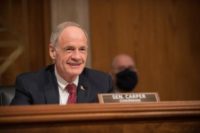While there is little to no evident progress in Washington on a big, wide-ranging infrastructure bill, Senate Environment and Public Works Committee leaders are moving on their version of a highway reauthorization measure, a key legislative priority for engineering and construction firms.
Committee Chairman John Barrasso (R-Wyo.) plans to hold an Aug. 1 vote of his panel on the bill, committee spokesperson Sarah Durdaller told ENR on July 22. .
The committee laid groundwork for the not-yet-introduced measure at a July 10 hearing on the need for a new highway reauthorization bill. It would succeed the current statute, the 2015 Fixing America’s Surface Transportation, or FAST, Act.
The FAST Act isn’t due to lapse until Sept. 30, 2020. But the committee’s chairman, John Barrasso (R-Wyo.), is pressing to be “first out of the gate” among congressional committees in drafting the highway portion of a new surface-transportation bill.
Barrasso said, “We have crumbling roads and bridges and they desperately need to be repaired or replaced.”
Neither Barrasso nor Sen. Tom Carper (Del.), the committee's ranking Democrat, said how much funding they would recommend, however. They noted that the revenue portion of the legislation would fall under the purview of the Senate Finance and House Ways and Means committees.
Barrasso also provided an outline of key elements that he wants to see in the highway legislation, including its span, which he said would be five years, the same as the FAST Act.
Barrasso also said he plans to have it continue the current system of dividing more than 90% of annual highway funds among the states by a formula.
The American Association of State Highway and Transportation Officials also wants to see the formula distribution continue, said Carlos Braceras, Utah Dept. of Transportation executive director, who was testifying for AASHTO.
Moreover, Barrasso said, the legislation will “speed project delivery through streamlining,” which means expediting issuing of project permits.
But Carper pointed out that “the hard part…is how do we pay for this?”
Speaking to reporters after the hearing, Carper declined to say how much money he’d like to see in the envisioned EPW highway bill. But he added, “We know that we’re not spending and investing enough and we need to do more.”
Carper added, “I like to say, there’s no silver bullets in terms of funding transportation infrastructure. But there are a lot of ‘silver BBs’—some are bigger than others.” He said that witnesses at the hearing provided “a pretty good laundry list” of revenue-raising options. Those items include raising the federal motor fuels tax, perhaps with a new fee of some type for electric motor vehicles, and at least a further test of a charge for vehicle miles traveled.
Barrasso said only, "I believe highways should be paid for by their users."
Barrasso said that if Congress fails to pass a multi-year bill and falls back on a series of short, stopgap measures—which it has done in the past— “we will undermine our states’ abilities to plan for these challenges.”
Braceras, who also is AASHTO’s current president, said that more funding is needed. He estimated that just to maintain current Highway Trust Fund spending levels, including an inflation factor, would mean Congress would have to locate another $90 billion dollars, if lawmakers pursue a five-year measure.
He added that if Congress doesn’t approve a FAST Act replacement by Sept. 30 of next year, trust-fund highway obligations would plunge by an estimated $51 billion and the trust fund’s transit account would drop to zero in 2021 or 2022.
Max Kuney, president of Max J. Kuney Co., a Spokane, Wash., construction firm, said a multi-year bill is a must.
Kuney, testifying for the Associated General Contractors of America, said Congress should not “repeat the mistakes of the past by kicking the can down the road with numerous short-term extensions.” That would mean projects will be delayed or cancelled, he added.



